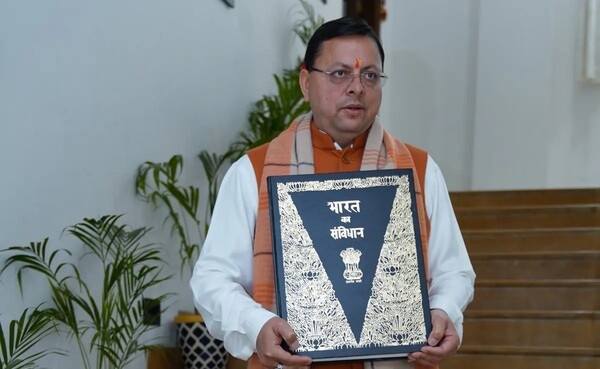Historic Moment! Uniform Civil Code introduced in Assembly; Ban on polygamy, legalising live-in and more
Total Views |
Dehradun, Feb 6: Chief Minister Pushkar Singh Dhami on Tuesday tabled the Uniform Civil Code (UCC) bill in the Uttarakhand Assembly. The Bill contains the laws relating to marriage, divorce, succession, live-in relationships, and related matters.

It recommends focusing on women's empowerment, including banning polygamy and forming a uniform marriage age across religions. Moreover, practices such as Halala, Iddat, and Triple Talaq under Muslim personal law will be punishable offences in the report submitted by the panel and mentions regulating live-in relationships.
LIVE: उत्तराखण्ड विधानसभा सत्र 2024
— Pushkar Singh Dhami (@pushkardhami) February 6, 2024
https://t.co/XRSIdKs6VQ
Here are key highlights of the Uttarakhand Uniform Civil Code
1. Marriage - The bill states the minimum age for marriage is 21 for a boy and 18 for a girl. Additionally, the Bill states clearly that only the marriage between a man and a woman is considered legal. Couples who have not registered their marriage can no longer claim the benefits of government schemes meant for couples and families.
The bill makes it mandatory that marriage registration needs to be done within 60 days of the ceremony and failing to do so will attract a maximum fine of Rs 20,000.
2. Live-In Relationships - Live-in partners in Uttarakhand will have to register themselves with district officials or face imprisonment under the state's Uniform Civil Code. Children born of such relation will be considered legitimate and deserted women partner entitled to maintenance their partners. "It shall be obligatory for partners to a live-in relationship within the State, whether they are residents of Uttarakhand or not, to submit a statement of live-in relationship under sub-section (1) of section 381 to the Registrar within whose jurisdiction they are so living," Section 378 of the UCC bill said.
The UCC Bill proposes that in case the couple fails to register their live-in relationship within the stipulated time, which is one month from the date of entering into such relationship, they shall be liable to be punished on conviction by a Judicial Magistrate with imprisonment ranging from 3 to 6 months or fine up Rs 25,000.
3. Divorce - The proposed UCC Bill in Uttarakhand would criminalize practices like halala, iddat, and triple talaq. No marriage can be dissolved without a court order or else there would be punishment of up to 3 years in jail. Marriage in violation of the condition specified for the same will result in jail term of six months and penalty of up to Rs 50,000.
4. Polygamy - Polygamy, allowed in India under Muslim Personal Law, has been banned across all religions. The UCC bill permits marriages only if "neither party has a spouse living at the time" — effectively prohibiting bigamy or polygamy. The conditions for solemnising a marriage also take "public policy and morality" into account and retains the ‘degrees for prohibited relationship’ exception.
Also, a partner can seek divorce and claim maintenance if they are forced to change their religion after marriage, the Bill states.
5. Tribals - Uttarakhand's tribal population has been exempted from the provisions. “Nothing contained in this code shall apply to the members of any Scheduled Tribes.... and the persons and group of persons whose customary rights are protected under the Part XXI of the Constitution of India," the bill says.
The Assembly session has been convened especially to pass the legislation on the UCC and make it an Act. The Cabinet's approval of the draft was needed for its introduction in the Assembly. If UCC is implemented, BJP-ruled Uttarakhand will become the first State in the country after Independence to adopt it. A UCC has been operational in Goa since the days of the Portuguese rule.


